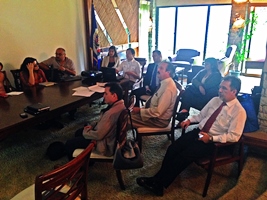
 On November 29, 2013, a group of Costa Rican ministers and government officials met with the Environmental Network of Urban Mobility at the OAS National Office in San José. At the gathering, two studies were presented to decision makers: “Impact of Bicycle Lanes in Costa Rica” and “Obstacles and Opportunities for Non-Motorized Mobility in Greater Metropolitan Areas of Costa Rica.” Both studies were conducted within the project “Promoting Alternative and Articulated Urban Transportation in Costa Rica.”
On November 29, 2013, a group of Costa Rican ministers and government officials met with the Environmental Network of Urban Mobility at the OAS National Office in San José. At the gathering, two studies were presented to decision makers: “Impact of Bicycle Lanes in Costa Rica” and “Obstacles and Opportunities for Non-Motorized Mobility in Greater Metropolitan Areas of Costa Rica.” Both studies were conducted within the project “Promoting Alternative and Articulated Urban Transportation in Costa Rica.”
The objective of this project is to lay the foundation for transformation of the nation’s greater metropolitan areas into spaces enabling non-motorized transportation. Topics of infrastructure and public transportation including buses and interurban rail lines were analyzed. This initiative is being implemented by the Foundation for Urban Development (FUDEU) and the Center for Environmental Rights and Natural Resources (CEDARENA), with the support of the Regional Central American Association for Water and the Environment (ARCA) and the Association of People Against Road Violence and Disrespect.
During the meeting, the Environmental Network of Urban Mobility shared an innovative proposal to connect non-motorized transportation with mass-transit systems and renovate bus route concessions nationwide. This proposal also contemplates the inclusion of bicycle racks in 20 percent of the fleet to be renewed, the installation of bicycle racks at bus stations, and a request to bus consortiums to promote the creation of bicycle rental systems in several greater metropolitan areas.
The audience included Vice Minister María Guzmán, Ministry of Environmental Energy and Waters (MINAE); Vice Minister Roy Barboza, Ministry of Housing and Human Settlements (MIVAH); Sileni Chávez of the Ministry of Health’s Costa Rican Network of Physical Activity (RECAFIS); and Luis Apuy, Regional Director of the Federated School of Engineers and Architects (CFIA). Vice Ministers Guzmán and Barboza proposed the inclusion of guidelines to promote non-motorized mobility in projects within their Ministries. They also recommended the inclusion of bicycle and non-motorized transportation criteria in future mass-transit and infrastructure concessions, especially housing projects.
 View Map
View Map